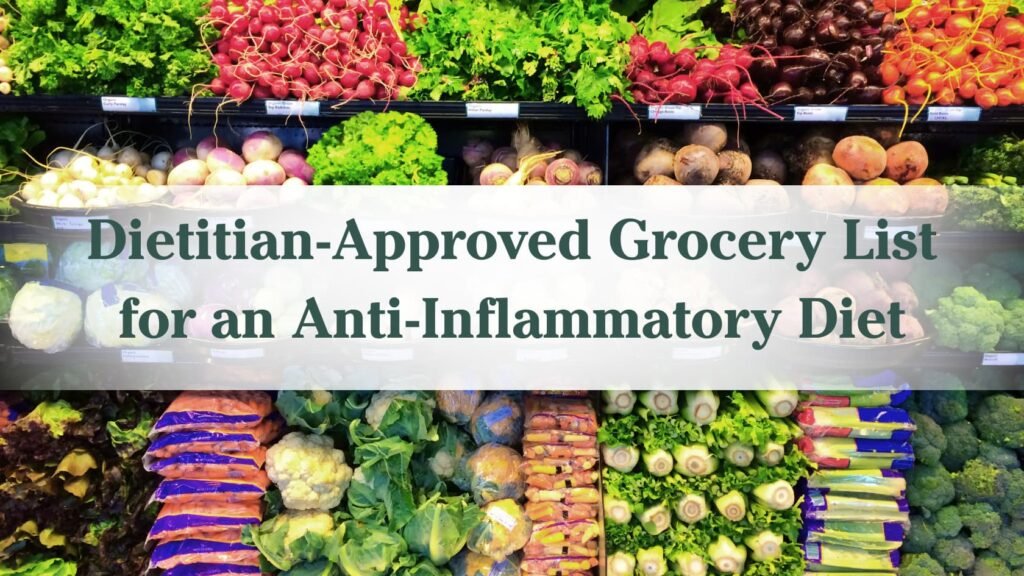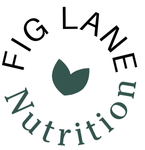Inflammation has been a buzz word lately on social media mainly being used by someone missing at least one article of clothing in the grocery store. And while they use it to often fearmonger a food, it is rarely followed by any strong evidence to support its claims. However, if some foods are pro-inflammatory you may be wondering, what foods can you add to your grocery list for an anti-inflammatory diet?
While diet is not the route cause of all inflammation nor can it resolve inflammation, it may be able to help. Many people turn to diet to help manage inflammation as something they can control.
An anti-inflammatory diet is intended to help optimize the inflammation potentials of diet. It does this by minimizing pro-inflammatory foods and drinks like red meat, saturated fats, refined carbohydrates, and alcohol just to name a few. It then works on maximizing potentially anti-inflammatory ingredients like fruits, vegetables, whole grains, healthy fats, and more in the diet [1]. Some people use this as an alternative or in combination with medications and lifestyle practices to help manage and protect their bodies from the effects of inflammation.
There are several different diets that could have anti-inflammatory properties to them including the Mediterranean diet, DASH diet, plant-based diets. They have common values such as minimally processed foods, plant-forward approaches, high fiber, low in saturated fats, limited alcohol, and more.
Below I put together a list of what you might find on my grocery list for an anti-inflammatory diet that takes a plant forward approach and notes tips for practicality and sustainability in an anti-inflammatory diet.

Protein
Something to take into consideration with protein options is how its cooked and meat processing as well. Cooking methods such as frying, grilling, or smoking and processed meats (deli meat, hot dogs, bacon, sausage, cured meats) are generally more pro-inflammatory [1,2]. Below is a list for some good low inflammatory protein options.
Animal-based protein
- Chicken: 96% lean ground chicken, breast, tenderloin, or thighs without the skin
- Turkey: 96% lean ground turkey breast, tenderloin, or thighs without the skin
- Fish: Salmon, trout, sardines, herring, mackerel, tuna, swordfish
- Lean fish: Cod, haddock, tilapia, halibut, snapper, flounder, grouper
- Shellfish:
- Lean red meats:
Plant-based Protein
- Beans (kidney, black, pinto, white, butter, garbanzo, etc)
- Lentils and Dals (red, yellow, green, black, etc)
- Edamame/Soybeans
- Tofu
- Seitan
- Tempeh
Fruits & Vegetables
Although there are specific fruits and veggies, like berries and dark leafy greens that are noted for their potential anti-inflammatory properties, they all have different nutrient compositions [1]. It is best to try to get a variety of fruits and vegetables of different colors (eat the rainbow and we’re not talking about a sweet colorful candy) to get a variety of nutrient combinations.
Fruits
- Apples
- Berries (blueberries, raspberries, strawberries, blackberries)
- Cherries
- Peaches
- Pears
- Plums
- Pomegranate
Vegetables
- Artichoke
- Asparagus
- Beets
- Broccoli
- Brussel sprouts
- Cabbage
- Carrot
- Cauliflower
- Celery
- Dark leafy greens (spinach, kale, collard greens, Swiss chard, mustard greens, bok choy)
- Eggplant
- Green beans
- Mushroom
- Peppers
- Radish
- Tomato
- Zucchini and summer squash
Really this list could go on-and-on but aim to get a variety of vegetables while trying to make some of them dark leafy greens.
Starchy Vegetables
- Casava/Yuca
- Corn
- Peas
- Potato
- Sweet potato
- Winter squash
- Yam
Whole Grains
- Barley
- Brown rice
- Bulgur
- Corn
- Farro
- Millet
- Oats
- Quinoa
- Sorghum
- Teff
Nuts and Seeds
Nuts and seeds can also include their nut and seed butters. However, when choosing nut and seed butters, you want to opt of saturated fats like palm, coconut, or hydrogenated oils used to makes some “no-stir” varieties.
Nuts
- Almonds
- Cashews
- Peanuts (actually a legume)
- Pecans
- Pine nuts
- Walnuts
Seeds
- Chia seeds
- Hemp seeds
- Flax seeds
- Pumpkin seeds
- Sesame
- Sunflower seeds
Healthy fats
Healthy fats includes nuts and nut butter, but also has contributions from foods high in unsaturated fats in addition to oils. While the sources of fats bellow are mainly unsaturated fat, different fat sources provide different amounts of omega-3 fatty acid concentrations. Omega-3s are generally the type of fats considered have potential anti-inflammatory properties [1,3].
- Avocado and avocado oil
- Canola oil
- Corn oil
- Olives and olive oil
- Peanut oil
- Safflower oil
- Soybean oil
- Sunflower oil
Fermented foods
Fermented foods come in varieties that can lean both sweet and savory.
Note: Some fermented foods can be high in sodium.
- Kefir (low-fat low-sugar dairy based)
- Kimchi
- Pickles
- Sauerkraut
- Yogurt (low-fat low-sugar dairy based or low-sugar plant-based verities without coconut)
Panty and Freezer Anti-inflammatory Diet Staples
While eating fresh fruits and vegetables is great, not everything has to be fresh off the vine to be considered anti-inflammatory. Their are certain processed foods that improve the accessibility and convenience of an anti-inflammatory diet that can be beneficial to keep on hand.
Pantry
- Canned or dried beans
- Canned tuna and salmon
- Freeze dried, fruit cups packed in juice, or unsweetened dried fruit
- Microwavable brown rice (or other whole grain) cups
- Nuts and seeds or nut and seed butters
- Whole grains (any noted above or other whole grains)
Freezer
- Bean or lentil curry (make a big batch and freeze the leftovers)
- Frozen mixed berries
- Frozen salmon filets
- Spinach
- Tofu (yes, you can freeze it)
Hydration
Water, not special water, not electrolyte water, not sugar water, plain old water is what most people need. Their nothing special about it, and its not anti-inflammatory on its own, but it does the trick in most cases when it comes to staying hydrated.
Aside from some research showing potential benefits of black coffee and tea, there are not really many other benefit to adding more to your water, unless you are a athlete or have excessive fluid losses [1].
That being said, water can be flavored with herbal teas, infused with fruit or cucumber and mint, or other herbs and spices to help provide more flavor. Additionally, seltzer and sparkling waters are also mainly just water, carbonation, and flavoring which is another fun way get your hydration in.
Non-alcoholic beverages
While non-alcoholic beverages are unlikely to provide anti-inflammatory benefits and may contain added sugar, if being used to replace alcoholic beverages, they could be beneficial in these cases.
What to Limit
What to limit is not as simple as it may seem because, pro-inflammatory foods may be paired with potentially anti-inflammatory foods to mitigate their effects.
The goal is to find a balance between mostly minimally processed and anti-inflammatory foods and limiting foods like ultra-processed foods, beverages high in saturated fat, high in sugar, and alcohol is ideal. Having trouble figuring this out? Check out some of my other posts for recipe ideas or even work with a Registered Dietitian.
Take Away
There are plenty of options from all food groups that can be added to the grocery list to support an anti-inflammatory diet. There are even some processed foods in the grocery store that can support the sustainability of an anti-inflammatory diet.
Prioritization of anti-inflammatory foods in the diet can help you maximize the potential anti-inflammatory properties of the diet. Although there are specific foods that in research show to have potentially stronger anti-inflammatory properties, limiting your food variety could lead to nutrient deficiencies.
Remember, the goal is to find a balance that works for you and your lifestyle. If you are having difficulty figuring that out, try working with a registered dietitian to help.
